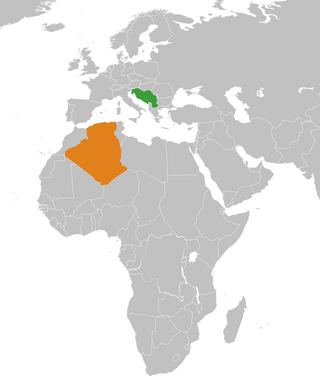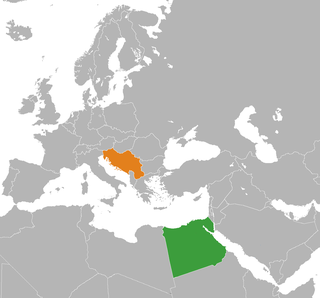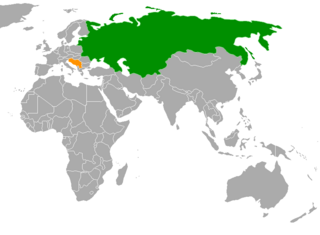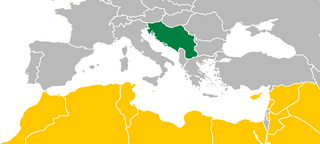
The Brijuni or the Brijuni Islands are a group of fourteen small islands in the Croatian part of the northern Adriatic Sea, separated from the west coast of the Istrian peninsula by the narrow Fažana Strait. The largest island, Veliki Brijun Island, (5.6 km2), lies 2 kilometres off the coast. The second largest island is Mali Brijun with an area of 1.07 km2, and twelve much smaller islands. Known for their scenery, the islands are a holiday resort and a Croatian National Park.

India–Serbia relations are foreign relations between India and Serbia. India has an embassy in Belgrade. Serbia has an embassy in New Delhi and an honorary consulate in Chennai. Both countries are key allies and were founding members of the Non Aligned Movement with Serbia being part of Socialist Federal Republic of Yugoslavia at the time. India was one of the nations that cosponsored the proposal to readmit the Federal Republic of Yugoslavia to the United Nations in 2000. India backs Serbia's position regarding Kosovo and supports Serbia's EU integration process. During her visit to Belgrade in 2013, Indian minister of state for external affairs Preneet Kaur stated that she hopes that Serbia will continue to support reforms in international bodies, including the United Nations, and India's bid to become a permanent member of the UN Security Council. In an interview for local media, H.E. Narinder Chauhan, Indian Ambassador to Serbia stated that "Despite of Breakup of Yugoslavia our political relations continue to be exceptional, marked by a long tradition of mutual support on issues of core interest... It is a matter of immense satisfaction that Serbia also supports India’s international role. India sees Serbia as a reliable partner."

The Socialist Federal Republic of Yugoslavia was one of the founding members of the Non-Aligned Movement. Its capital, Belgrade, was the host of the First Summit of the Non-Aligned Movement in early September 1961. The city also hosted the Ninth Summit in September 1989.

Indonesia–Yugoslavia relations were historical foreign relations between now split-up Socialist Federal Republic of Yugoslavia and Indonesia. Both countries were founding member states of the Non-Aligned Movement. Two countries established formal diplomatic relations in 1954. First diplomatic documents were exchanged as early as 1947. Breakup of Yugoslavia, one of the founding and core members of the Non-Aligned Movement, brought into question the very existence of the Movement which was preserved only by politically pragmatic chairmanship of Indonesia.

Algeria–Yugoslavia relations were historical foreign relations between Algeria and now split-up Socialist Federal Republic of Yugoslavia. Both countries self-identified with the wider Mediterranean region and shared membership in the Non-Aligned Movement. During the Algerian War Yugoslavia provided significant logistical and diplomatic support to the Algerian side which affected its intra-European relations with France. Yugoslavia was the first European country to openly support the FLN.

Egypt–Yugoslavia relations were historical foreign relations between Egypt and now break-up Yugoslavia. Both countries were founding members and prominent participants of the Non-Aligned Movement. While initially marginal, relations between the two Mediterranean countries developed significantly in the aftermath of the Soviet-Yugoslav split of 1948 and the Egyptian revolution of 1952. Belgrade hosted the Non-Aligned movement's first conference for which preparatory meeting took place in Cairo, while Cairo hosted the second conference. While critical of certain aspects of the Camp David Accords Yugoslavia remained major advocate for Egyptian realist approach within the movement, and strongly opposed harsh criticism of Cairo or proposals which questioned country's place within the movement.

India–Yugoslavia relations were historical foreign relations between India and now split-up Socialist Federal Republic of Yugoslavia. Yugoslavia established full diplomatic relations with India on 5 December 1948 following the 1948 Tito–Stalin split. Initially two countries developed their relations at the UN Security Council in 1949 during their shared membership. In the period of the Cold War both countries were the founders and among core members of the Non-Aligned Movement.
Egypt was one of the founding members of the Non-Aligned Movement (NAM). The preparatory meeting for the First NAM Conference in Belgrade was held in Cairo between 5 and 12 June 1961. The first NAM conference was cosponsored between President of Egypt Gamal Abdel Nasser and President of Yugoslavia Josip Broz Tito who sent joint letter to other leaders during their bilateral meeting in Egypt. Cairo hosted the Second Conference in October 1964 attended by forty-seven countries while Egyptian Red Sea resort Sharm el-Sheikh hosted the Fifteenth Conference in 2009. At the time of the Sharm el-Sheikh Conference 118 countries participated in the activities of the movement with some other countries having the observer status. 55 heads of state attended the 2009 conference. Official Egyptian state institutions view the movement as the broadest and the most important framework for developing countries to coordinate their stances on issues on the agenda of the United Nations and to act together against unilateral policies.

Cambodia–Yugoslavia relations were historical foreign relations between Cambodia and now split-up Socialist Federal Republic of Yugoslavia. The first official meeting between Norodom Sihanouk and President of Yugoslavia Josip Broz Tito happened in 1956 on Brijuni islands in Yugoslav constituent Socialist Republic of Croatia. Till 1976 Sihanouk visited Yugoslavia on five occasions while President Tito visited Cambodia twice. Cambodia was one of the countries represented at the 1961 Summit Conference of Heads of State or Government of the Non-Aligned Movement in Belgrade, the first conference of the Non-Aligned Movement. Yugoslavia credited and participated in construction of the Kirirom 1 Hydropower Dam which was completed in 1969.

Summit Conference of Heads of State or Government of the Non-Aligned Movement on 1–6 September 1961 in Belgrade, Yugoslavia was the first conference of the Non-Aligned Movement. A major contributing factor to the organization of the conference was the process of decolonization of a number of African countries in the 1960s. Some therefore called it the ″Third World's Yalta″ in reference to 1945 Yalta Conference.

Third Conference of the Non-Aligned Movement on 8–10 September 1970 in Lusaka, Zambia was the third conference of the Non-Aligned Movement. A preparatory meeting of Foreign Ministers drafted a number of resolutions which were considered by the Summit Conference. President of Zambia Kenneth Kaunda opened the conference by underlining non-alignment as "the natural choice at the time of increased hostility created by ideological conflicts in the bipolar world"

The Non-Aligned Movement (NAM) is a forum of 120 countries that are not formally aligned with or against any major power bloc. It was founded with the view to advancing interests of developing countries in the context of Cold War confrontation. After the United Nations, it is the largest grouping of states worldwide.
Second Summit Conference of Heads of State or Government of the Non-Aligned Movement on 5–10 October 1964 in Cairo, United Arab Republic (Egypt) was the second conference of the Non-Aligned Movement which followed the Belgrade Conference of 1961 and preceded the Lusaka Conference of 1970. The city of Cairo was selected as a host of the summit conference at the preparatory meeting held in Colombo, Ceylon, on March 23, 1964. At the beginning of the conference the chairmanship of the Movement was transferred from the President of Yugoslavia Josip Broz Tito to the President of Egypt Gamal Abdel Nasser.

The 9th Summit of the Non-Aligned Movement on 4–7 September 1989 in Belgrade, SR Serbia, SFR Yugoslavia was the conference of Heads of State or Government of the Non-Aligned Movement. Belgrade was the first city to host the Summit for the second time after it hosted the 1st Summit of the Non-Aligned Movement in 1961. Yugoslavia was unanimously selected as the host of the Summit at the 1988 Non-Aligned Foreign Ministers Conference in Nicosia, Cyprus. While the Federal Secretary of Foreign Affairs of Yugoslavia led by Budimir Lončar was excited, the Presidency of Yugoslavia, Yugoslav collective head of state, was skeptical about the prospects of hosting the event but ultimately supported it by Josip Vrhovec in fear that rejection may show the level of the crisis in the country. The comparatively weak federal government organizers of the event ultimately hoped that the conference may convince leaders of the strong Yugoslav federal republics to resolve the early Yugoslav crisis in a constructive and peaceful way, yet it nevertheless escalated in 1991 Yugoslav Wars. The event is therefore sometimes described as the swan song of the prominent Yugoslav Cold War diplomacy. Summit took place at the Sava Centar in New Belgrade. Janez Drnovšek held the opening remarks in Slovenian language.

60th Anniversary Additional Commemorative Non-Aligned Meeting is the 11–12 October 2021 Non-Aligned Movement commemorative meeting taking place in Belgrade, Serbia. The meeting was organized by the Ministry of Foreign Affairs of Serbia, and cohosted with Azerbaijan, in commemoration to the 1st Summit of the Non-Aligned Movement. President Ilham Aliyev made opening speech in a video format. Minister of Foreign Affairs of Serbia Nikola Selaković underlined that his county's strategic and essential goal is membership in the European Union, but that Serbia will not give up on its traditional friends which are not only Russia or China but all member states of the Non-Aligned Movement. While reflecting on historical achievements Indian representative Meenakshi Lekhi invited honest introspection if movement is to keep its relevance and called unnamed member states to avoid insistence on divisive issues and bilateral score-settling which make NAM increasingly ineffective. Participants vocally decried the disparity in vaccine access between developed and developing countries.

Soviet Union–Yugoslavia relations were historical foreign relations between Soviet Union and Yugoslavia. Both states are now-defunct states with dissolution of the Soviet Union from 1988 through 1991 and breakup of Yugoslavia from 1991 through 1992. Relations between the two countries developed very ambiguously. Until 1940 they were openly hostile, in 1948 they deteriorated again and in 1949 were completely broken. In 1953–1955 period, bilateral relations were restored with the signing of Belgrade declaration, but until the collapse of Yugoslavia they remained very restrained. Relations with Soviet Union were of high priority for Belgrade as those relations or their absence helped the country to develop the principle of Cold War equal-distance on which the Yugoslav non-alignment policy was based.

The 1987 Mediterranean Non-Aligned Countries Ministerial Meeting held on Brijuni Islands, SR Croatia, SFR Yugoslavia was the second ministerial meeting of the Non-Aligned countries from the Mediterranean region. The meeting restricted the number of participating countries exclusively to the few Non-Aligned nations of the Mediterranean area and as such focused primarily on regional issues. At the time of the meeting the group included Southern Mediterranean and Levantine Arab countries and only three European Non-Aligned countries of Malta, Cyprus and SFR Yugoslavia.
1969 Non-Aligned Movement Consultative Meeting took place in Belgrade, SR Serbia, SFR Yugoslavia on 8–12 July following the Warsaw Pact invasion of Czechoslovakia in August 1968. Non-interventionism was put on the top of the agenda by the host nation while the discussion over the national liberation caused some divisions with Algeria requesting their full participation but only Palestine Liberation Organization being granted the right to participate on equal footing. Algeria in turn blocked Yugoslav proposal to admit countries formally aligned in military pacts but pursuing policy close to non-alignment such as the Socialist Republic of Romania and Czechoslovak Socialist Republic which tried to distance themselves from Soviet led Warsaw Pact and Malaysia, Singapore, Tunisia and Pakistan most of which were part of Western led Baghdad Pact or Southeast Asia Treaty Organization.
Sri Lanka is one of the founding members of the Non-Aligned Movement. Principles of Non-Alignment and participation in movement's activities is of high priority in foreign policy of the country.

The "Josip Broz Tito" Art Gallery of the Nonaligned Countries was an art gallery in Titograd in the Socialist Republic of Montenegro, one of the federal subjects of the Socialist Federal Republic Yugoslavia. It was the only art institution established directly by the Non-Aligned Movement's decision.




















